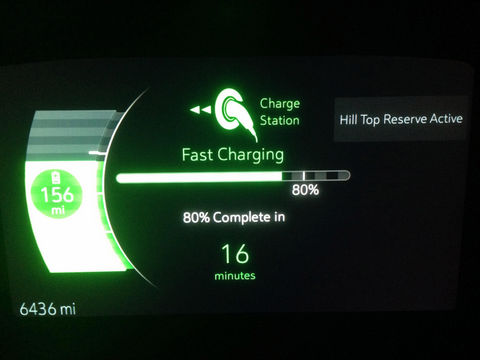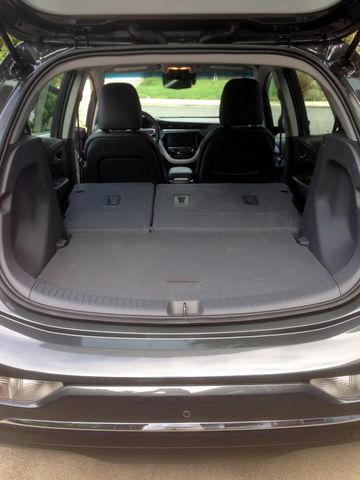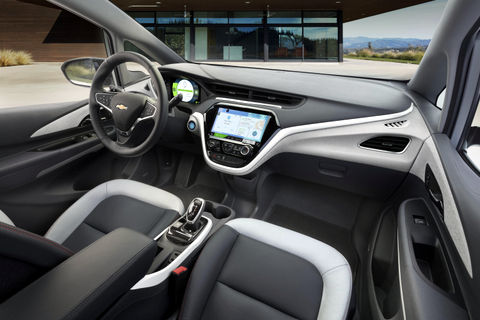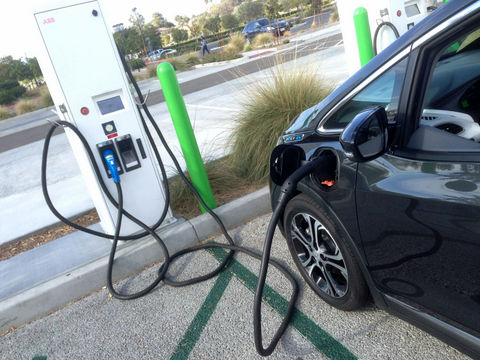One Year Update for the First Affordable 200+-mile Range EV
Is ‘Game Changer’ over used, or maybe even a bit passé, because everything and anything of late is considered the greatest? Just as actors can be celebrities, but all celebrities are not stars, the 2017 Chevrolet Bolt EV whooshed right past the celebrity tag and quickly became a star. How else would you categorize an all-electric car that goes 238 miles on a single charge and costs in the mid-$30,000 range? That qualifies as a game changer—and a star.

The five-passenger small car market is increasingly being populated by all-electric offerings, with the Volkswagen e-Golf, Nissan Leaf, Hyundai Ioniq, Kia Soul, Ford Focus and Fiat 500e among the top sellers in this category. To design the Bolt from a clean sheet, Chevrolet knew they had to do something far different than these other EVs that topped-out in the 130-mile range and also cost in the mid-$30Ks. And no, they weren’t looking at them for inspiration.
Chevrolet looked higher and went after Tesla. The Tesla S and X can go between 208 and 335 miles on a charge, depending on which model you buy, but you will pony-up between $70K and $120K. The much anticipated (and delayed) Tesla Model 3 is rated at a 310-mile range (for the big battery pack), but the base price is somewhere around $44,000. The latest word out of Palo Alto is that the $35,000, 220-mile range “Standard” Model 3s won’t begin production until the end of 2018.
So, could Chevrolet produce an all-electric car that costs roughly the same as their main five-passenger small car competitors, but has the range of the larger and more expensive contenders? Yep, they did. The Chevrolet Bolt has been on the market for a little more than a year. It is on sale in all 50 states. We thought it was time to catch up with one of the people behind this ground-breaking electric car.
Bolt Philosophy and Importance
Clean Fleet Report had the opportunity to speak with Darin Geese, Chevrolet cars customer segment leader. We covered a range of topics including the Bolt and the electrification of vehicles at General Motors. It was a fascinating conversation.
CFR: What is the importance of the Bolt and its technology within Chevrolet and General Motors?
Geese: The Bolt for Chevrolet and General Motors is the first long-range, affordable electric vehicle in the industry. We are pretty proud we delivered on the three promises made to Mary Barra (General Motors CEO) at the 2016 Consumer Electronics Show, that we would be over 200 miles (of range); under $30,000; and available to be onsale by the end of the year. We delivered on all three with a 238-mile EV range, a price of $29,995 (less the Federal tax credit) and the first retail deliveries were December 13, 2016.
As we look forward to what role it is playing, the Bolt is the halo. It provides advanced zero emissions technology, and gives a look at what electric vehicles could be in the future. By packaging the battery pack beneath the floor, this opens the passenger compartment because, with a flat floor you don’t have tunnels and footwells. By not having an engine under the front hood, more components can be placed up there, and the windshield can be pushed forward. The Bolt seems smaller on the outside than it really is on the inside.

CFR: How does this apply to other General Motors vehicles?
Geese: This opens it to different vehicles, body styles and types, and let’s us ask “what are the possibilities?”
CFR: What statement did you want to make about the Bolt?
Geese: We wanted to say: we are an all-electric vehicle, providing enough range that pretty much gets rid of range anxiety, as 238 miles will take you through many days of normal driving activities. We still see the average American driving around forty miles daily, round trip. So at 238 miles, this is five day’s worth of driving before needing to recharge. We do encourage people to treat the Bolt like their cell phone and plug it in overnight.
CFR: The EPA estimates a 238-mile range. What feedback have you received from owners about real-world driving distances?
Geese: The majority of our customers are getting more miles than they expected, with reports of over 300 miles. For Chevrolet, it is good to hear back from an average perspective that we are delivering and exceeding on our promises.
CFR: Any first year warranty issues?
Geese: There has been nothing abnormal to the regular vehicles we produce. It is nits and nats, and mostly customers not understanding how the vehicle is supposed to operate. We get people not knowing how to pair their Bluetooth phone, but nothing at all about the electric vehicle technology.

CFR: How have sales been in the first year? Is the Bolt EV sold in all 50 states and at all dealers? What percentage of Bolt sales are in California?
Geese: Sales through November 2017 have been 20,649 units (ed. note: full year sales were 23,297, second only to the Tesla Model S in plug-in cars), with 50-percent of Bolt sales in California. The Bolt EV is sold in all 50 states, but we do not require all dealers to sell the vehicle. It does take some investment on the dealer’s part, such as putting in charging stations and all the tools and equipment and training they need to sell and service the vehicle. So, we see about a third of our dealers have signed-up, which is good as they are focused and committed. These are the kind of dealers we want to see.
CFR: When the Bolt was being developed, was the Tesla Model 3 a prime competitive target? What, if any, strategies were designed for the Bolt with the Model 3 in mind?
Geese: There was a strategy to be there (in market) ahead of them, which we did before their first units were produced. This is the first mover advantage. But we had to look at them not as a direct competitor, because they are offering a different body style, sort of like a compact luxe sedan. The Bolt is a small crossover and that kind of buyer does not cross shop between sedans and crossovers. It’s going to be interesting how the consumer reacts to their vehicle, their likes and dislikes, especially the packaging from the standpoint of rear headroom and rear leg room. We think we are very competitive in these areas with the Bolt EV.
CFR: You mentioned the Bolt is a crossover. I see it as a compact car.
Geese: When we do our product research, that is exactly one of the things we try to understand: What would you call this vehicle? How would you describe it? And for the most part customers said

it is a cross between a SUV and a passenger car. It’s a funny thing, because there is no official SAE (Society of Automotive Engineers) definition of a crossover. When we submit our information to the EPA, they also do not have a crossover segment. They have SUVs and they have wagons, so the Bolt ended-up being classified as a small wagon, just like the Kia Soul, Toyota Prius V and Nissan Juke. It’s kind of a mixed bag of what is in there. For the most part, we do feel confident in the crossover designation as you do sit up higher with a bit more commanding view of the road, you have a tremendous amount of cargo space and the flexibility of the vehicle being able to manage both passenger and cargo. We even have the optional Rear Camera Mirror that is geared towards when there is a lot of cargo in the back and blocking your vision.
CFR: Let’s talk about the General Motors autonomous vehicle program. Is Bolt the go-to vehicle for self-driving cars within GM?
Geese: At this time we are utilizing the Bolt EV as the platform to develop our autonomous vehicle technology. And that is pretty much all we can say about it.
CFR: In closing, what are your thoughts on the past year, the next big thing for the Bolt, the Bolt platform, and electric vehicles within Chevrolet and General Motors?
Geese: We are very happy with the Bolt EV at our one-year anniversary. Month-over-month sales increases and everything about the vehicle, from production to customer satisfaction, has been good. You know, these buyers are very tough critics sometimes, very specific about what they want. So, when you hear great feedback and satisfaction, especially with the number one reason they are buying the vehicle, which is the EV range, we are knocking that one out of the park.
We are always looking out for the next big thing, like do we want to do a sedan, or more of a SUV? This market is so new that defining the sweet spot is anyone’s guess at this time. It was very interesting to see all the other manufacturers come out with different types of EVs, with different body styles and how they present those, and the consumers’ reactions.
So, it is very exciting times at this point. We are excited to continue on.
Related Stories You Might Enjoy:
Road Test: 2017 Chevrolet Bolt
Personal: One Year with My Chevrolet Bolt
Flash Drive: 2018 Nissan Leaf
Road Test: 2017 Volkswagen e-Golf
Road Test: 2017 Hyundai Ioniq
Road Test: 2016 Kia Soul EV
Road Test: 2016 Ford Focus Electric
Road Test: 2017 Fiat 500e

2 thoughts on “Interview: Chevrolet Bolt EV at One Year”